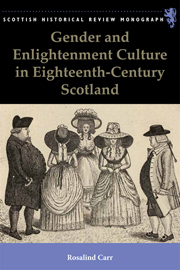SHIFTING IDEALS OF BEHAVIOUR and sentiment served to assert manhood amongst different groups of men in eighteenth-century Scotland, and men could adopt different manly personas depending on locale and time of day. Take, for instance, James Boswell, who embodied polite and libertine manhood. His days in Edinburgh often progressed from heterosocial suppers and visits to the theatre with his wife and other women, to homosocial meetings of the Freemasons, Faculty of Advocates or intellectual societies, followed by drinking in a tavern or coffeehouse and sometimes sexual intercourse with women, including prostitutes.
Rather than a binary opposition, Georgian archetypes of the polite gentleman and the libertine stood at two ends of a continuum of possible masculinities, and landed and professional men could perform characteristics of these identities depending on the specific context. Boswell wished to achieve an ideal of refined, virtuous manhood but from his time as a young man visiting London through to married, professional life as a lawyer in Edinburgh, his behaviour displayed adherence to a libertinism of convivial tavern-based sociability and extramarital sex. Boswell was not necessarily atypical, and this chapter will explore the fluidity of manhood in his and other elite men's lives in eighteenth-century urban Scotland.
Recent studies of English masculinities during this period have explored libertine, impolite, polite and domestic manhood. These histories highlight significant differences in the performance of ideal manhood manifested by the masculinities of the libertines and bohemians of London, and landed gentlemen and merchants displaying self-control through economic management of household and estate, and fatherly leadership. These and other studies demonstrate that multiple masculinities were available to landed, professional and middling men. This was as true for Scotland as for England, and this chapter will explore the continuum of polite and libertine expressions of manhood in eighteenth-century Scotland through an examination of violence, independence, sexuality and friendship. To do so it will draw on a variety of sources with a focus on men's life writing, a source that offers an entree into their articulation and negotiation of gender identity.
